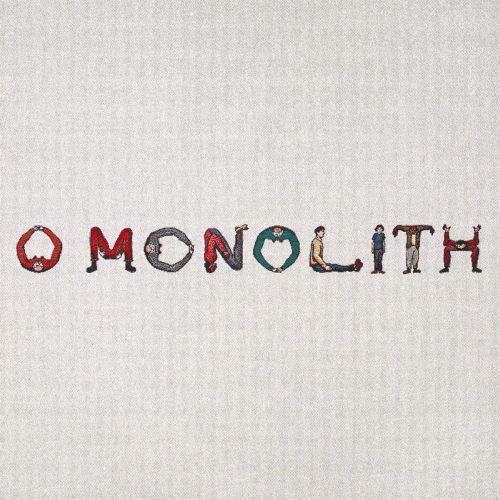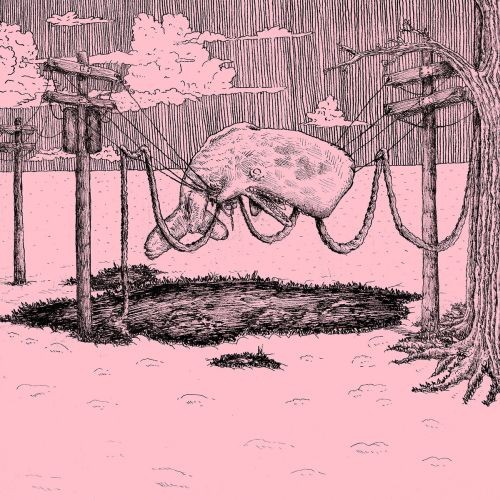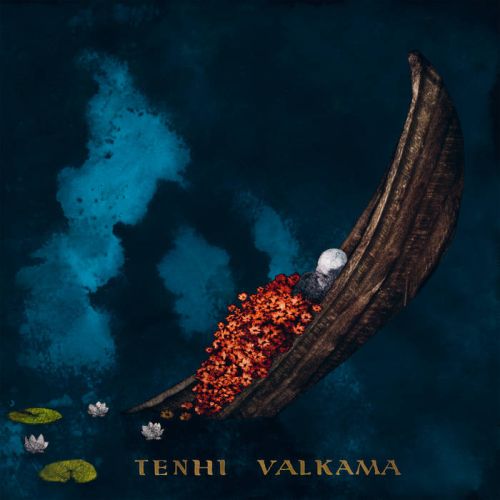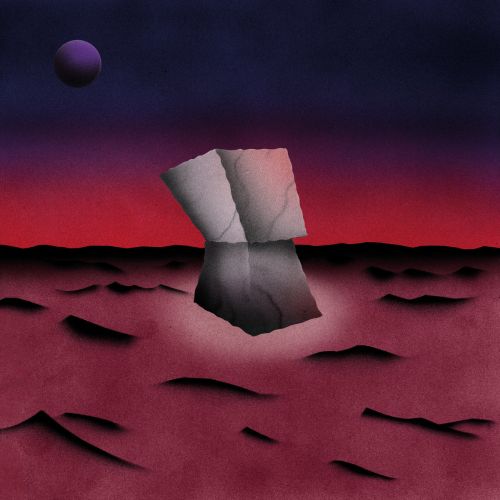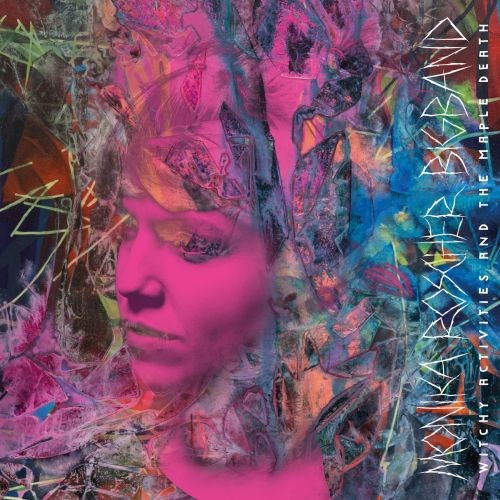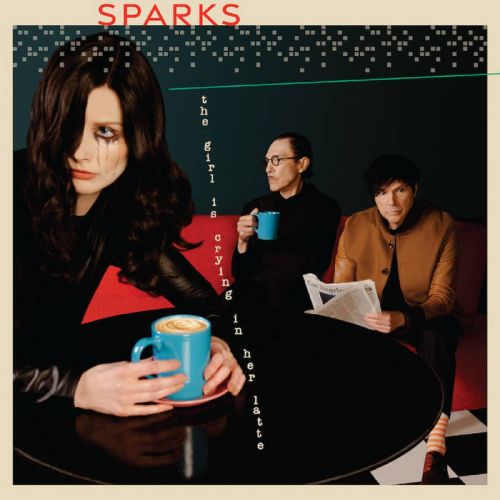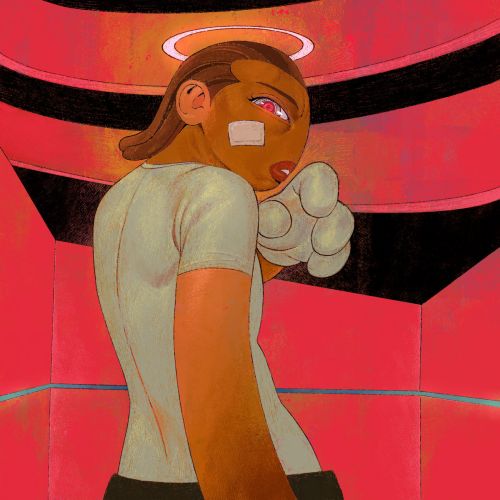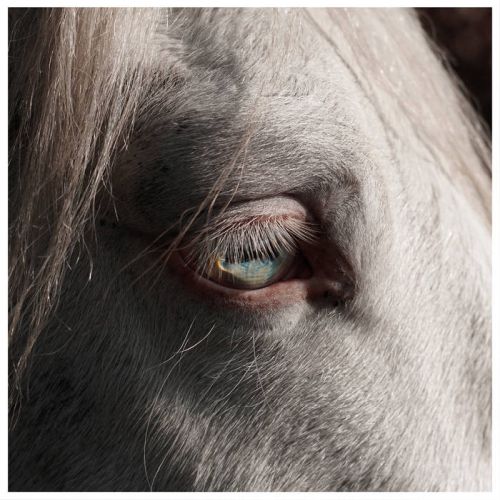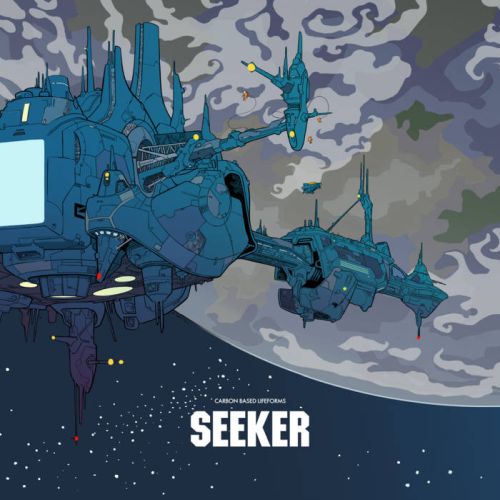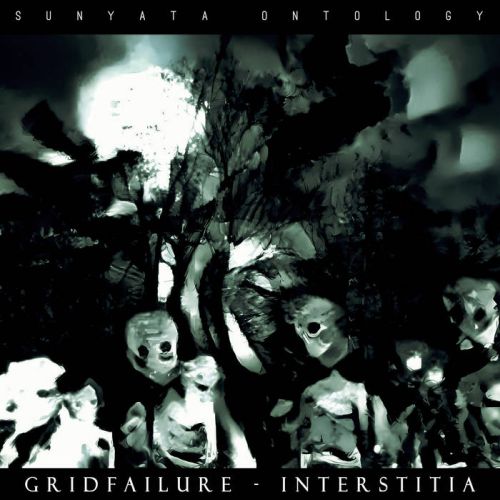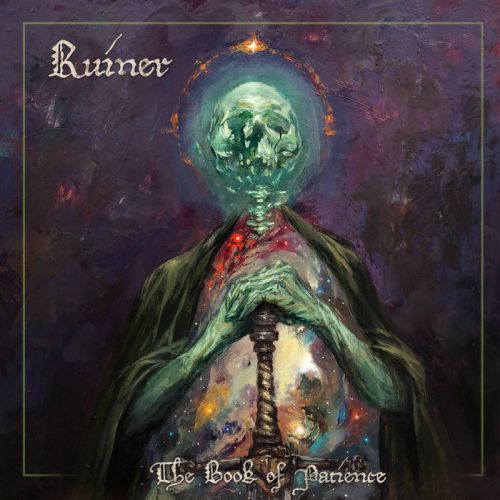Wait A Minute! This Isn't Metal! - June 2023

| Written by: | RaduP, musclassia, ScreamingSteelUS, X-Ray Rod, Roman Doez |
| Published: | July 17, 2023 |
Wait A Minute! This Isn't Metal! - June 2023
Metal Storm's outlet for nonmetal album reviews
The place where we'll talk about music without growls or blast beats
unless they still have those but still aren't metal
unless they still have those but still aren't metal
We here at Metal Storm pride ourselves on our thousands of metal reviews and interviews and article; metal is our collective soul and passion, which is why we bother with this junk. That being said, we'd be lying if we stuck to our trve-kvlt guns and claimed that metal is the only thing we ever listen to. Whether we want to admit it or not, we do check out some other stuff from time to time; some of us are more poptimistic than others, but there's a whole world out there aside from Satan-worshiping black metal and dragon-slaying power metal. We do already feature some nonmetal artists on our website and have a few reviews to back them up, but we prefer to limit that aspect of the site to those artists who have been a strong influence on the metal scene or who are in some way connected to it. This article series is the place for those artists who don't matter to metal in the slightest but still warrant some conversation - after all, good music, is good music, and we all know metal isn't the only thing on this planet for any of us.
Down below, you might find some obscure Bandcamp bedroom projects or some Billboard-topping superstar; as long as it ain't metal and the album itself isn't a best-of compilation, it fits. Obviously, we're certain that not everything will be for everybody (you guys can be viciously territorial even when metal is the only thing on the menu, and we're all supposed to like the same things), but we do hope you find at least one thing that you can enjoy, instead of just pointing and screaming in horror "Not metal!" as if that would be an insult.
Here are our previous features:
May 2023
April 2023
March 2023
And now to the music...
This is not just another Foo Fighters album; it is the first to not feature Taylor Hawkins, who passed last year, since 1997’s classic The Colour And The Shape. Like The Colour And The Shape, Dave Grohl is behind the kit this time around, even though Hawkin’s replacement Josh Freese had already been confirmed by the time this album was announced. However, while But We Are Here stands out on that front, it is musically planted right in the middle of where you would expect Foo Fighters to be in 2023. Is that a bad thing? Not necessarily, but it’s also not the most exciting thing.
It's not that But Here We Are is a straight regurgitation of recent Foo Fighters; it’s not as dad rockish as Sonic Highways, nor does it (understandably) have the playfulness of parts of Medicine At Midnight. While lyrically poignant, it’s not a persistently glum record, although certain songs, such as “Hearing Voices” and the semi-ballad “The Glass”, are a bit on the subdued side. What the album does have is easily memorable choruses, whether it’s the easy melody of “Under You”, or the raw yells in the title track. There’s little in the way of surprises here, but “Show Me How” draws attention, both due to how understated it is instrumentally, and because Dave Grohl’s daughter Violet duets with him throughout the song. This isn’t the best Foo Fighters album, and would not be particularly memorable without the emotionally charged circumstances surrounding its coming into being, but it’s a respectable first step into a post-Hawkins world for the ever-dependable rockers.
Apple Music | Spotify
by musclassia
I have a desk fan blowing in my face as I write this, and yet I still feel like the cover art. The sunburn isn't helping either (bring solar protection cream on your trips, learn from my mistakes). That out of the way, here's a new Phoxjaw album! You might be wondering why this band is featured in our database but we still review them only in this feature (so far). Well they're in a very select group of bands where they don't have much in terms of connections to metal, like sharing members with bands or being the kinda band you would expect to find at metal festivals despite not being metal, nor is their sound really metal, but there's just enough heaviness and a dash of a certain subgenre, in this case alt metal, that we could get away with having them here. And maybe notverynicecream could've been a main page review and I'm only covering them here for convenience. Maybe.
And the more I listen to notverynicecream, which, despite having no chance to ever get Phoxjaw added to something like Metal-Archives, oozes of heaviness and is as a whole more heavy rock focused than its predecessor, which was the album that had them added here. And that also includes plenty of noise rock that makes sure that there's some legit noise to join the alt metal / post-hardcore heaviness, and all of it contrasts with the pop sensibilities of the band's more straight-forward alt rock / post-punk leanings. Hearing melodic choruses one would expect from British alternative music contrasted with chuggy guitars and bursts of noise make me thing that there really are ways to blend metal and mainstream music quite efficiently (unlike something like Sleep Token), so hopefully this will get the recognition it deserves and Phoxjaw will afford some air conditioning and to fix their space bar.
Bandcamp | Apple Music | Spotify
by RaduP
Squid's debut album was a surprise hit. Its extravagant approach to art punk made it memorable and an instant success in the music world. Now, Squid have to prove that they are no one trick pony, and that's exactly what O Monolith achieves.
While this new release does by no means reinvent the wheel, it helps to cement Squid's unique style and improve it. The 40 minutes run time helps with the memorability that the 54 minutes long Bright Green Field lacked at times, and the new ideas the band explores are interesting enough to make this release stand out and separate itself from the massive success that was the debut. The use of a vocoder for example is memorable and helps in crafting this album its own identity. While the songwriting is very good, the highs the album reaches are not quite as good as Bright Green Field's. There are however no real lows, as the 40 minutes run time allows the release to feel more concise, no time is wasted and every song gets to fully develop without overstaying its welcome. O Monolith might not be a drastic improvement over Squid's debut, but what it achieves is enough to solidify the band's position in the current art punk scene. It is a very creative and memorable album that will be remembered for the years to come, until Squid manage to make something better again.
Bandcamp | Apple Music | Spotify
by doez
Here's another band whose heaviness might eventually land it in our database, with post-hardcore and especially the screamo influences being things that are part of some of the bands we've already added but as a whole both genres are still too nebulously "just heavy" to really have a clear line. That said, Home Is Where take those sounds and blend them with a slightly math rock inspired midwest emo with a strong folk punk backing as well. Thus, more heavy music for the non-metal feature. Home Is Where's debut album from 2021, I Became Birds seems to have garnered quite a lot of acclaim, though not sure if that it really reached modern classic status, but just me asking that question should be enough to tell that there's a bit of pressure on Home Is Where to avoid the sophomore slump.
Themed around "the desensitization and disorientation of tragedy becoming mundane", a topic about as emo as it gets, a lot of the album's emotional impact lies in Brandon MacDonald's vocals, which I can see as being a bit hard to swallow with the very nasal belt that they usually stay in, contrasted with the heavier and ironically more accessible screams. The instrumentals themselves borrow from 90s post-rock and midwest emo as a skeleton, imbuing it with the aforementioned heavier post-hardcore riffs and screamo vocals, and a pinch of Neutral Milk Hotel-esque indie folk that seeps in the vocals too. It's definitely the kind of album that feels very rewarding once you get over some of its quirks and the rawness of the performances.
Bandcamp | Apple Music | Spotify
by RaduP
When this ended up on my queue for this month’s issue (Thanks Radu), I had no idea what to expect given the artwork and the genre tags. Art Punk always felt like a meaningless term to me but I guess the reason is my general lack of knowledge. But now that I’ve heard Protomartyr’s 6th record… Honestly I still have no idea what to expect of the genre or think about this album! But I enjoy challenging albums. I’ve even heard the term sad punk being used to describe these post-punkers from Michigan. More like brooding really. There is a constant feeling of detachment and longing running through this record. The hypnotic state of sadness is enhanced by the rhythm section that keeps a certain percussion pattern more or less unchanged in each song with very few alterations. At its best it is absolutely entrancing and really pulls you in as you start to appreciate the dark synths and guitar leads (See “Let’s Tip The Creator”). But if you don’t like a particular groove or percussion then you are out of luck because they hammer that shit in for the remainder of the track. It’s a double-edged sword but thankfully they nail it most of the time.
Another element that made or broke a song for me was Joe Casey’s vocals. For most of the tracks I really enjoyed his morose, detached style that seemed to come from a man with no fucks left to give. This is pretty on point with goth-rock and post-punk and adds to the captivating yet grim atmosphere of the record like on “Graft vs Host”, “Polacrilex Kid” and “Rain Garden”. But there are some moments like on “Fun In Hi Skool” where Casey sounds like a drunk that got hold of the mic at Karaoke night and sings way too loud. These cringe moments are few and far between and I suspect they might be an element you can easily get used to (especially if you enjoy this album with a few drinks already in your system). But I still get the feeling that his vocals could have been used better if they were a little bit lower in the mix. But then there are tracks like “3800 Tigers” where his shouts are absolutely stunning and add an exhilarating layer of rebellious freedom. It’s definitely the most fiery track from the record.
I can’t say if Formal Growth In The Desert is the best starting point to get into Protomartyr or not. But I can say for sure that it sparked my interest. So if you are into music that can go from hypnotic and melancholic to groovy and thrilling while still having a darkness covering the whole thing over, then this album is for you.
Bandcamp | Apple Music | Spotify
by X-Ray Rod
Everything from the band name to the album title to the album cover is pretty goofy, and this kind of punk album could either be forgettable comedy rock or use its quirky humor for more experimental directions. Thankfully, Geese go for the latter of the two. It being such a new band with only one other album out (that I haven't heard when it was first released), there wasn't any expectations as to what 3D Country would be other than knowing its genre tags, but it still felt like more than I had expected from it. To put it bluntly, I didn't expect that amount of southern rock to find its way into a punk album.
And when I say southern rock, it's more of an amalgamation that also includes a strong alt-country, and its punk counterpart of cowpunk, but that also takes a lot from that 60s and 70s rock era in general, so blues rock and soul still feel like they have a pretty strong presence soundwise. However the punky tones and the experimental flavors make this quite similar to the early explosion of post-punk when the genre was exploding in a myriad of directions. The band is re-contextualizing the sound for the more modern art punk scene, but a lot of the strengths come less from the genre fusions themselves but more from how passionate the entire band feels like in both the louder more explosive tracks and in the more tongue-in-cheek bluesier tracks.
Bandcamp | Apple Music | Spotify
by RaduP
Country is one of the genre that suffered the most from very bad PR from its most successful artists. The post-9/11 bro country commercialized sound ruined country for generations to come, even if people still really hold stuff like Johnny Cash and Merle Haggard on a high pedestal. So obviously there's a lot of great country music, but generally seeing the "country" tag is more of a deterrent, unless it's joined up by its "alt" descriptor. "Alt-country" instead has a pretty good reputation because it's a quick way to discern whether a country album will have any ounce of soul in it, even if an album's authenticity can't really be boiled down to just that factor. So I'm not sure how much Jason Isbell is actually an alt-country artist and how much he's just a country artist that happens to be good.
Perhaps it has something to do with how Jason Isbell approaches country from a bit more of a southern rock perspective, having been part of southern rock band Drive-By Truckers, so a lot of the instrumentation for Weathervanes, while not necessarily rock, has a bit in terms of guitar-centrism that lets it be filled by licks and solos a bit more easily. The songs themselves, regardless of their mood, have a very warm feeling about them, something that feels more in line with heartland rock than just country, but the album just oozes of heartfelt emotions. And the lyricism and their delivery is what really sets Weathervanes apart, as the music itself doesn't delve that far from country rock tropes. So, in a way, this album is immediately accessible, and also immediately rewarding, but without feeling like it had to sacrifice some soul to get there.
Bandcamp | Apple Music | Spotify
by RaduP
In case there is anyone out in the world still feeling betrayed by Bob Dylan’s pivot toward electric music in the mid-‘60s, Shadow Kingdom might be taken as an olive branch; Dylan’s 40th album collects 13 now-ancient tracks from decades past and reinterprets them as the vessels of venerable reflection that are in vogue for well-traveled artists in their twilight years. Drawn primarily from Dylan’s inaugural streak of electric recordings, with Highway 61 Revisited and Blonde On Blonde most represented, the tracks featured on Shadow Kingdom shed all percussion and amplification for a sound that is less modern, if not quite a full return to roots: Dylan is still accompanied by other musicians, just acoustically, and the smoky, cocktail-hour crooning is decidedly less boisterous than his trademark delivery. But one listen to “Tombstone Blues,” here a formless, half-spoken piece of musical impressionism that sharply contrasts its original punk-bluegrass rattle, is enough to demonstrate the inspiration that lies within this collection. Or observe “What Was It You Wanted,” which replaces esoteric groove with haunting, dynamic balladry, or “Most Likely You’ll Go Your Way (And I’ll Go Mine)”, which turns the a riffy saunter into a suave railyard round.
Shadow Kingdom is the soundtrack to a concert film of the same name – a film that was actually recorded and released in 2021, during a much deeper phase of the COVID-19 pandemic. What this album offers is the sound of Bob Dylan in a close, quiet setting, in a sparsely populated hall at the end of a long night, a feeling of full-band folk rock songs revisited in the liminal space created by a worldwide shutdown and no doubt emphasized by Dylan’s advancing age. Shadow Kingdom has an intimate atmosphere in which much nostalgia can be divined. Despite its imagery and concept, however, it is not as grim or final as, for example, American IV or Blackstar, nor is this meant to be an epitaph; Dylan is still an energetic and musical performer, and there is a playful quality to some of these re-themed melodies that washes away any inference of decrepitude. It is, perhaps, an entirely reflective album, both optimistic and pessimistic, with lighter and darker takes on these old tunes. However each song fares in its new interpretation, the overall effect of Shadow Kingdom is an invigorating reminder of Bob Dylan’s longevity and skills as a poet and musician. It is evident that he intends to stick around for as long as the world will have him, and we’re luckier for it.
Apple Music | Spotify
by SSUS
They might not have the same reputation as some of their more illustrious Nordic neofolk brethren, but the Finnish group Tenhi have been around for longer than most of them. Valkama is their sixth record, which isn’t a lot for a group that formed in 1996, but with this album coming a whole 12 years after Saivo, Tyko Saarikko are clearly making up for lost time here, as this album pushes the 70-minute barrier. Valkama remains resolutely within the world of acoustic folk, but it is slightly less ambient than their previous outing.
Saivo ended with a 10-minute song; Valkama, conversely, opens with an 11-minute one, and the incredibly subdued of most of “Saattue” might leave one wondering whether this is a straight continuation of where the group were a dozen years ago, but the song does flesh out as it progresses, with piano and group vocals emerging above the acoustic guitar parapet. The piano is quite a prominent feature of Valkama, dominating some songs while lighting up others; a particularly beautiful passage later on in the title track has some achingly evocative piano melodies accentuating choral vocals and acoustic strums. The title track is probably the peak of this release, but the delicate acoustics of tracks such as “Rannankukka” and “Laineinen”, as well as more substantial and emotional cuts like “Hele” and “Sydämes On Tiel”, very much work their charm.
Bandcamp | Apple Music | Spotify
by musclassia
RaduP's pick
One of the bands I had no idea were still active and could expect a new album from, Witch were the ones I was most surprised to stumble upon when searching for new music. I had to check whether this was truly a new album or something re-recorded way back when. For those unfamiliar with the band or with Zamrock in general, it is indeed a pretty jolly coincidence that this one African country produced some of the best psych rock of the 70s, even if the scene was a brief moment in time and African music continues to struggle in the global market. Witch are arguably the most successful of the bunch, the ones I discovered first, and 1975's Lazy Bones!! is my pick for that scene's most emblematic album. Now, nearly 40 years after the last Witch album, we have a new one.
I usually have a bone to pick with bands returning with barely any original members, in this case vocalist Emmanuel Jagari Chanda and keyboardist Patrick Mwondela, with neither of them having been in the original band at the same time and only Chanda being a founding member and a member on the band's landmark albums. However, Zambia's instability and the AIDS epidemic that followed the booming 70s lead Witch with only Chanda as its sole surviving founding member, so having another lease of life with some newer musicians to offer an outsider's perspective and modernize a very specific sound created something that still manages to sound very authentic and groovy. It has a lot in common with both the heavy psych that Zamrock originally borrowed from as well as with more Afrobeat sounds that weren't necessarily part of the original sound.
Bandcamp | Apple Music | Spotify
by RaduP
musclassia's pick
While it didn’t stop them from becoming one of the major early influences on the desert rock scene, Yawning Man were for the longest time not a recording band; founded in 1986, their first studio album only came out in 2005. Clearly something clicked in the 2000s, whether it was the decline of ‘generator parties’ or a gradual willingness to have a recorded legacy, as since then there’s been a slow but steady stream of album releases. Long Walk Of The Navajo is notable amongst their discography for being the first to feature bassist Billy Cordell and drummer Greg Saenz, who round up the current line-up alongside only remaining founding member Greg Arce.
It's also notable for featuring a clear shift in writing style; while Yawning Man have always been a mellow, mostly instrumental, jam-style psychedelic rock group, the compositions on their previous albums have still fallen roughly within the vicinity of the 5-minute mark. In contrast, the title track of Long Walk Of The Navajo is 15 minutes long; to fill this additional space, the group’s writing has arguably become even more languid than it was on the last few records, if that’s possible. The steady, slick rhythm section makes for a tidy backdrop to atmospheric texturing on the part of Arce; there’s little in the way of riffs here, but plenty of sustained guitar leads and other layers. It makes for a super chilled-out, pleasant listening experience.
Bandcamp | Apple Music | Spotify
by musclassia
Archy Marshall has been one of the underground's most versatile and interesting musicians the past decade, starting to make music in his teens more than a decade ago, and using various aliases to make punk, hip-hop, and indie music. The King Krule project has been the one that got the most attention and that solidified Archy as a musician who could've broken into the mainstream if he really wanted to, but even with collaborations with some big names chose not to chase the limelight. The Ooz and Man Alive! sound like the kind of moody jazzy indie that would be huge on Tik Tok (I assume), so him not being sort of a household name just between the underground and the mainstream does create a very interesting context.
Space Heavy continues the very dreary and moody atmosphere focus that previous King Krule had. Even with a very understated and lowkey presentation, there is still a lot that goes on in the way the moods here are constructed. Other than Archy's more deadpan vocal delivery, which is something that does fit the mood, the background is filled with more floating surreal neo-psychedelic instrumentation that often jumps into some jazzier passages that can border on post-rock, with the percussion also sounding like out of a drum&bass song. All of this also goes through moments where the slowcore inclinations of past records get even more fulfilled, something that makes the sparse vibe feel even more emotionally impactful.
Bandcamp | Apple Music | Spotify
by RaduP
musclassia's pick
It’s always nice to come across an album from a band I’m unfamiliar with that’s tagged as post-rock, and to then find out it’s not something I’ve heard numerous times before. To be fair, though, post-rock isn’t an accurate representation of No Harmony, the debut from Klidas. There’s some of the dynamic structuring associated with that record, but this is arguably more a progressive rock record, or even a jazz rock one, not too far from some material Jaga Jazzist have conjured up before. The inclination to label it as jazz does come in large part due to the presence of the saxophone, but a track such as “Not To Dissect” clearly has more jazz in its DNA with the drum rhythms and off-kilter arrangements Klidas incorporate into the song.
No Harmony is a mellow album on the whole; there are ebbs and flows within tracks, but never to explosive heights or sparse depths. There are some proper psychedelic rock riffs to be encountered here, such as during “Not To Dissect” and the lively climax of “Shine”, but this isn’t an album that pushes the dial too much on the volume front. There’s also some vocals to be heard here, although the record is predominantly instrumental; to be honest, the vocals are perhaps the weakest part of No Harmony, so they’re not really missed in the large portions of the album in which they’re absent. It’s an album that starts off well with “Shores”, a gentle and tender opener that sounds a bit like what Portico Quartet might come up with if they went in a rockier direction; closer “The Trees Are In Misery” falls at the opposite end of the spectrum, dialling the jazz right down and committing to full-pelt fuzzy rocking out. It’s fun, but I feel it’s with songs such as “Shores” and “Arrival” that Klidas really make their mark on this debut.
Bandcamp | Apple Music | Spotify
by musclassia
Experimental jazz mixed with progressive pop, progressive rock and avant-prog, how does that sound? I am not familiar with Monika Roscher's work, but I clearly need to listen to the rest of her discography, as Witchy Activities And The Maple Death is a resounding success on nearly all fronts.
One of the trickiest things to do when blending genres is to properly do it. Many albums will have some tracks be a genre and other tracks be another one, never actually mixing them. That was one of my main complaints with April's Fire-Toolz album, it did not go all the way through with its promises. Monika Roscher Bigband does however not disappoint. The unique fusion of genres is consistent throughout the album's whole run time, and it is a real success. The album's sound is unique but never feels off or out of place, there is a real sense of coherence and that makes it stand out among other original project. The album's generous 64 minutes run time can act against it, as a slight feeling of repetitiveness settles in by the end, but it never is strong enough to make the album unenjoyable. The overall quality of the songwriting remains consistently good, with some very memorable tracks like "8 Prinzessinnen", the "Witches Brew" suite, "Creatures Of Dawn" or "A Taste Of The Apocalypse" to name a few. The production feels very modern, for better or for worse, and Monika Roscher's Björk-like vocals are definitely not for everyone, but the quality of the instrumentation and the originality of the compositions are enough to consider this album a real success worth listening to, and one of the most memorable releases of the year.
Bandcamp | Apple Music | Spotify
by doez
musclassia's pick
I have been one of many to muse over recent Leprous releases, and whether they’re becoming tantamount to an Einar Solberg solo project; challenging those assertions comes 16, the actual first Einar Solberg solo record. Like many such releases, it is very much not a solitary endeavour, as Solberg has recruited a number of guests to feature here, from Raphael Weinroth-Browne and Ihsahn (both of whom have collaborated with Leprous) through to Ben Levin Bent Knee and Þórarinn Guðnason (Agent Fresco). Despite these metal-associated contributors, this is the kind of ambitious, ethereal art pop album that you were probably expecting Solberg to come up with.
Weinroth-Browne is the first guest to contribute, his ever-compelling cello adding texture to the lengthy, tender title track. The remaining songs feature a good amount of variety; “Remember Me” could have slotted into Pitfalls or Aphelion, its trip-hoppy origins culminating in a more symphonic rock sound, but the minimalist electronica of “Megacognitive” is one end of an exuberance spectrum that is countered by the quirkiness of “Home” (featuring Levin’s rapping paired with soul trumpet arrangements). Given how annoying I find Bent Knee, it’s probably not a surprise that I’m not that keen on “Home”, but overall 16 is a compelling album despite its length (69 minutes), and late-album treats such as the grandiose “Splitting The Soul” (the closest to an Aphelion-era Leprous song, and with Ihsahn adding some screams to boot) and lengthy, multifaceted closer “The Glass Is Empty” really seal the deal. At this point, any attempts to pin down my dislike of Pitfalls on it being overly dominated by Solberg seem to have been firmly quashed, as it turns out an album on which he has full creative control sounds pretty darn great.
Apple Music | Spotify
by musclassia
Play The Girl Is Crying In Her Latte for any inexperienced listener and they could posit any number of explanations for Sparks. They’re a Ween-y Midwest glam band with a Eurobeat fixation; they’re an experimental house duo who got stranded in London’s post-Britpop indie scene; they’re two French comedians who started jamming out hyperpop-lite as a side gig. It is unimaginable that Sparks have been raising eyebrows for 52 years – Russell Mael still has the vocal presence of a teen heartthrob practicing his Mick Jagger strut in anticipation of beating Cheap Trick to their own success, and Ron Mael still synthesizes novel soundscapes as if he had not only remained current with all subsequent developments in electronic evolution but had personally spurred them onward with his frightful glower. I’d spend this entire review wallowing in vicarious prestige if I didn’t know that basking is for people who have nothing new to say on their 25th album.
The Girl Is Crying In Her Latte, like many a Sparks album over the last couple of decades, is a keyboard-driven array of obtusely maximized hooks built out of Russell’s flighty narrations, with no or minimal percussion and compulsive repetition that renders the inane lyrical motifs increasingly surreal. Although there are a few rockier numbers mixed in – “Take Me For A Ride” in particular getting unusually heavy in an industrial-remix-of-the-Psycho-theme sort of way – this album generally turns away once more from the more band-oriented sounds that A Steady Drip, Drip, Drip revived. Ron puts all his passion into punchy synth beats and moody orchestrations to underpin Russell’s flouncy falsetto refrains. While experienced Sparks fans may be able to divine from that description what sort of an album they’re facing, this band is always eager to inspire confusion in new ways: they’re far too juiced on whimsical irony for the tense and grimy beats of “A Love Story” and the distressing tension of “We Go Dancing” to make thematic sense, but too surreptitiously sharp not to wither in the venomous art-punk nonsense of “Nothing Is As Good As They Say It Is” and swingy synth sarcasm of “The Mona Lisa’s Packing, Leaving Late Tonight.” Listening to a Sparks album is like interrogating a double agent who is at all times wearing a clown nose and insists that he is a quadruple agent. All compliments, naturally. Perhaps the one thing that shines most of all about The Girl Is Crying In Her Latte is how well Ron has repurposed newer trends in electronic music for his own villainous ends; there are bouncing piano jaunts reminiscent of the very, very old days and some of their old disco dealings, but when I hear these modern and immersive swaths of synthpop, synthwave, baroque pop, and even chiptune, it’s hard to believe that this band predates nearly all recognizable forms of electronic music.
Bandcamp | Apple Music | Spotify
by SSUS
Like 99% of the planet, I found Killer Mike through him being one half of the wildly successful hip-hop duo Run The Jewels, only later discovering the stuff he did with Dungeon Family before going solo with his Pledge albums before finally hitting it with El-P for the R.A.P. Music album, something which felt both like his best achievement so far but also a catalyst for the two hitting it with Run The Jewels. And with Run The Jewels 5 being apparently on the horizon, there didn't seem like there would be much to hope for either artist returning to doing solo work. Well, after more than a decade, here's a new solo Killer Mike record.
I had some pretty big expectations for this album, probably the biggest among mainstream hip-hop albums this year, not only because of who it would come from, but also because the cover art and title indicated that this would be a more introspective and personal album from Mike. But while there is some of that on Michael, too much of it feels to inconsistent and middle of the road, with a lot of modern hip-hop/trap infusions that don't feel like they fit that well, and some very questionable politics from someone who had a pretty decent track record thus far. The lowlights aren't very low and the highlights themselves are worth it, but this doesn't seem like an album I'm very compelled to return to in full.
Bandcamp | Apple Music | Spotify
by RaduP
RaduP's pick
A lot of the hip-hop albums that I check out don't actually get covered, some of it due to lack of time, some of it due to now knowing how much the folks here are interested in hip-hop, some of it due to me not being very good at writing about hip-hop ("uhh... I like the lyricism... and the flow... and the beats"). One of those albums I checked out was McKinleyDixon's For My Mama and Anyone Who Look Like Her, an album whose beauty can probably be gathered from the title alone, but it was still a bit rough around the edges, and yet full of so much potential. Seeing that its follow-up would be even shorter than 30 minutes in runtime did make me curious.
Considering how much I often criticize albums for overstaying their welcome, it's only fitting that an album so concise and focused as Beloved! Paradise! Jazz!? would really hit with me, not only because of how it makes me eager to push the replay button, but because none of its moments, even the more interlude-y ones, feel wasted. The jazz background feels even more lively than most jazz samples you find in jazz rap and conscious hip-hop, and that brought an even more uplifting tone fitting of the album's title. Even taking away the lyricism, which already made me remember a bunch of lines after the first listen, this is just so nice to listen to for something that doesn't feel like it had that much of a budget but made the most of it.
Bandcamp | Apple Music | Spotify
by RaduP
“More instrumental post-rock? Well, does it do anything different? No? Well I’m leaving then.” OK WAIT just a minute; I mean, OK WAIT aren’t reinventing the wheel, but they do have a certain something about them. There’s a clear underlying metal influence here, which comes to the fore in moments like the blasts in the closing stages of opening track “Escape”, as well as the muscular riffing of songs such as “Horses”. They’re also a bit more brooding and imposing than a lot of their crescendocore brethren.
Quite a bit of that comes from the guitar tone, which definitely nudges them further towards heavy instrumental post- bands such as Year Of No Light, but also the drumwork, with its extensive use of thick tom rolls, makes a firm impression. There’s also some non-metallic but challenging sounds that owe more to noise rock, plus dreamy passages with a hint of shoegaze to them. There’s also a track like “Mantra”, which has a psychedelic daintiness to it not far removed from some Weedpecker material. It’s not a record that’s going to change your opinion on post-rock, but if you like the genre yet only enough to try a few releases per year, Signal is one that’s worth spending your quota on.
Bandcamp | Apple Music | Spotify
by musclassia
Some bands just aren’t made for making bleak music. Sigur Rós, in particular, can try as hard as they can to embody their music with fears of climate change (see the striking artwork) and hell, along with frustrations from legal and personal strife (the latter reflected in the absence of a drummer for the first time), but the music they produce on Átta is still the epitome of serenity. Their eighth album, Átta (which literally translates to ‘Eight’) is the group’s first in a decade, and sees their ambient post-rock bolstered by the London Contemporary Orchestra, as well as Kjartan Sveinsson’s keyboards, with Sveinsson rejoining the band to keep the member number at 3 despite ex-drummer Orri Páll Dýrason’s departure.
Now, while this record is feather-light and peaceful, it’s not devoid of hints of sadness or introspection; on “Mór”, Jónsi is predictably angelic, but there is a hint of melancholia amidst the floating soundscapes and evocative strings, while “Skel” has a feeling of longing to it. Still, it is that borderline ambient calm of the vocals, keyboards and strings that’s the defining feature of this album, as typified in “Blóðberg”. The song lengths on Sigur Rós records have been getting shorter over time, but there is space for a 10-minute closing title track, albeit one that is borderline silent in its second half with how faint the ambient keys are. After a long time away, Iceland’s second-most famous musical export is back, and with an album as ‘cinematic’ as fans likely hoped it to be.
Bandcamp | Apple Music | Spotify
by musclassia
Carbon Based Lifeforms is inherently a really cool name; it’s one that I feel like I’ve heard mentioned before, but Seeker is my first time trying them out. It came out 1 day after the 20-year anniversary of the Swedish psychedelic ambient duo’s debut release Hydroponic Gardens, and a quick skim through that album suggests that their modus operandi has remained fairly stable in the intervening two decades. Compared to my reference points for psybient (Ott and Globular), Seeker does sound more intrinsically ambient, but it does also feature plenty more of substance to imbue it with a real personality.
The additional electronics on top of the spacey ambient backdrops have a bright-sounding whimsy to them reminiscent of albums like Tycho’s Dive, particularly in the case of the radiant, chilled summer track “Nukleator”. In contrast, “Bloom Pt. 1” is more subtle in its evolution, sparse sounds and effects converging towards the end of the track into something more concrete, while “Departed” flies right past ambience into a sound more reminiscent of synthwave, pulsating beats throbbing while subtle synth melodies lurk almost imperceptibly towards the back of the mix. “Departed” very much stands out on the album; I would dig having more tracks in a similar vein here in place of a few of the more stripped-down ambient cuts, but even without that wish granted, this is a charming album to put on and chill with.
Bandcamp | Apple Music | Spotify
by musclassia
Sunyata Ontology (or Sunyata Ontologoy, according to the Bandcamp title), is a collaboration of two electronic solo projects. By themselves, Interstitia (aka Graham Scala) conjures up ambient, psychedelic techno, with a mostly bright musical palette but some more subtly abrasive inclinations, while Gridfailure (David Brenner) infuses his creepy dark ambient with sinister experimentations. Gridfailure has shown a propensity for collaborations previously, with previous albums featuring the likes of [url= https://gridfailure.bandcamp.com/album/harbinger-winds]Megalophobe[/url], Mac Gollehon, and Rack; this latest endeavour sees Brenner once again find a fascinating middle ground between his own work his partner du jour.
Certain tracks here, including the opener “Call Of The Black Hand” and “Clandestine Interrogation Tactics”, are slabs of moody industrial electronica, but the techno/IDM elements of Interstitia rise to the surface of cuts such as “Omega Agency” and “Traces Of Cult Factions”, the latter of which also has a slight synthwave vibe to it. Beneath whatever beat the duo are dabbling with, there’s a lingering dark ambient undercurrent running through Sunyata Ontology, which becomes noisier and more intrusive on the final songs, starting with “Pattern Recognition”. It’s an ominous album, but it’s not necessarily abrasive or bleak, just giving off a slight air of unease instead.
Bandcamp | Apple Music | Spotify
by musclassia
The Book Of Patience: could there ever be a more apt title for an 80-minute single-song drone/ambient record. Despite the very metal album-looking cover, Ruiner is not a metal project, although their Bandcamp’s FFO section mentions Sunn O))) and Bell Witch. Ruiner is a one-man project belonging to New Mexico’s Zac Hogan, and was initially conceived as a live-only experience; however, 13 years after its genesis, Ruiner can now be heard in recorded form.
The Book Of Patience is, in some ways, reminiscent of the timelapse vibe that I associated with Nadja’s Sv, in that the changes on a second-by-second level are negligible, but skipping forwards 5 or 10 minutes into “Liber Patientiae”, the sole comprising song, can reveal remarkable changes. Unlike Sv, which started and ended quietly while swelling in the middle, “Liber Patientiae” is unidirectional; to start with, it is pure celestial ambience, and it’s not until past the half-hour mark that this really begins to change. It’s here that Ruiner’s use of the central instrument, a 5-string bass played with a bass bow, emerges, and what starts as eerie drones ever so gradually start to encroach upon and dominate that celestial ambience, before eventually overpowering it in a cacophonic wall of distortion, which ultimately collapses into static noise. While this is not an album to listen intently to, there’s a certain charm to putting it on, forgetting you’re listening to it, and losing your sanity as it turns increasingly sinister.
Bandcamp | Spotify
by musclassia
And that was it. You've made it through still alive. Congrats. See ya next month. Here's a Spotify playlist we compiled out of stuff featured here:
Comments
Comments: 6
Visited by: 67 users
| Auntie Sahar Drone Empress |
| Vellichor Posts: 571 |
| afterbirthbec |
| RaduP CertifiedHipster Staff |
| Nejde |
| musclassia Staff |
Hits total: 3233 | This month: 71





